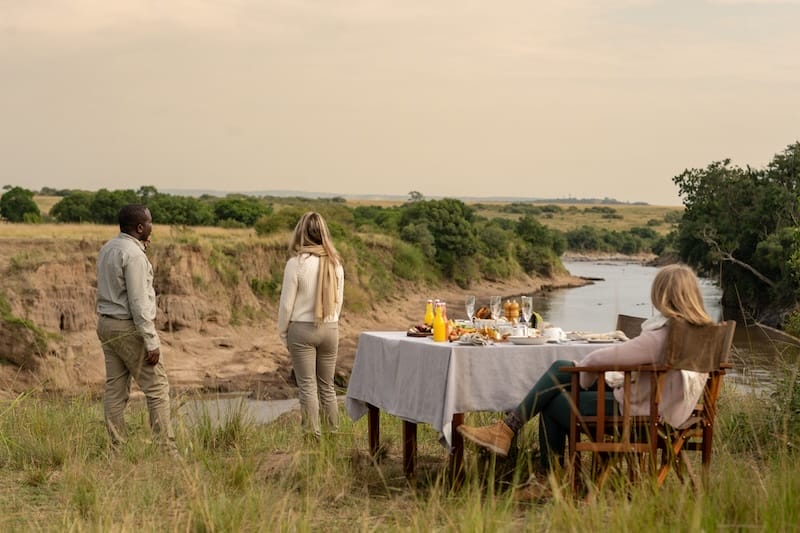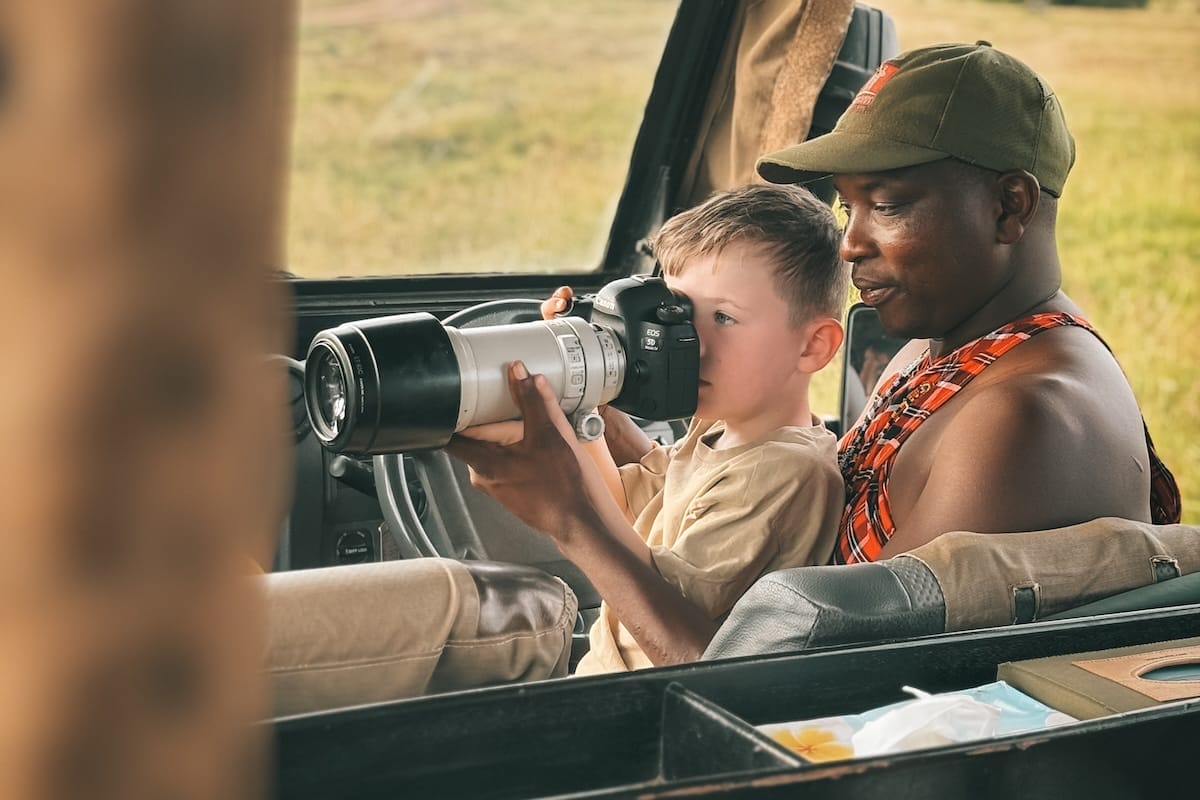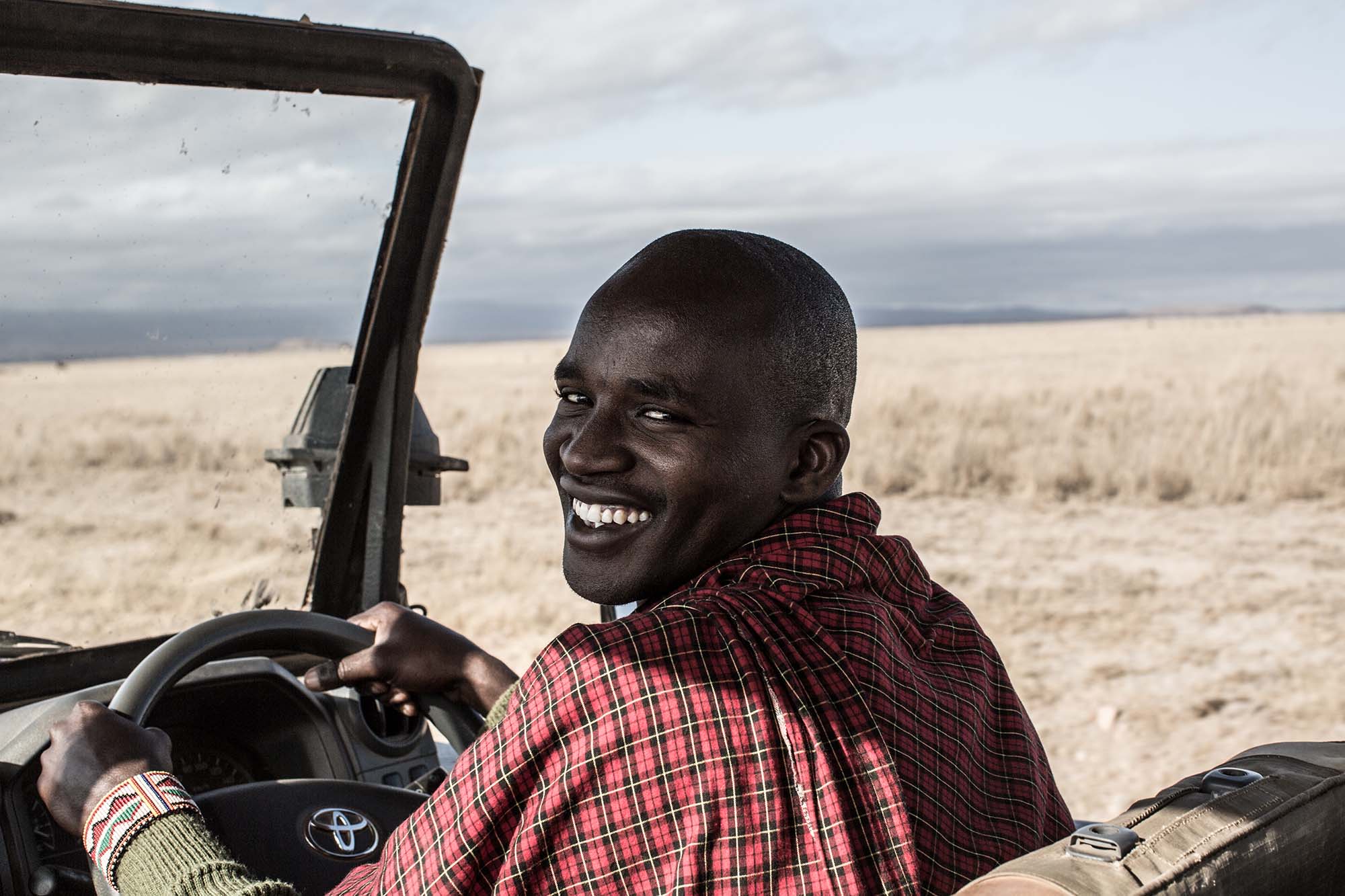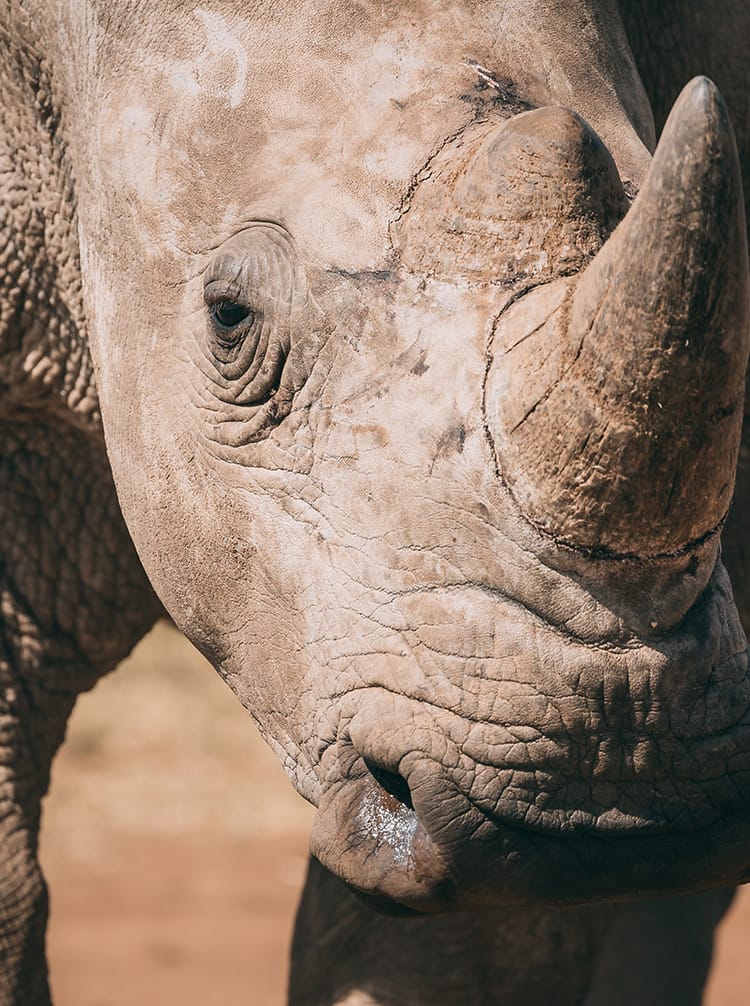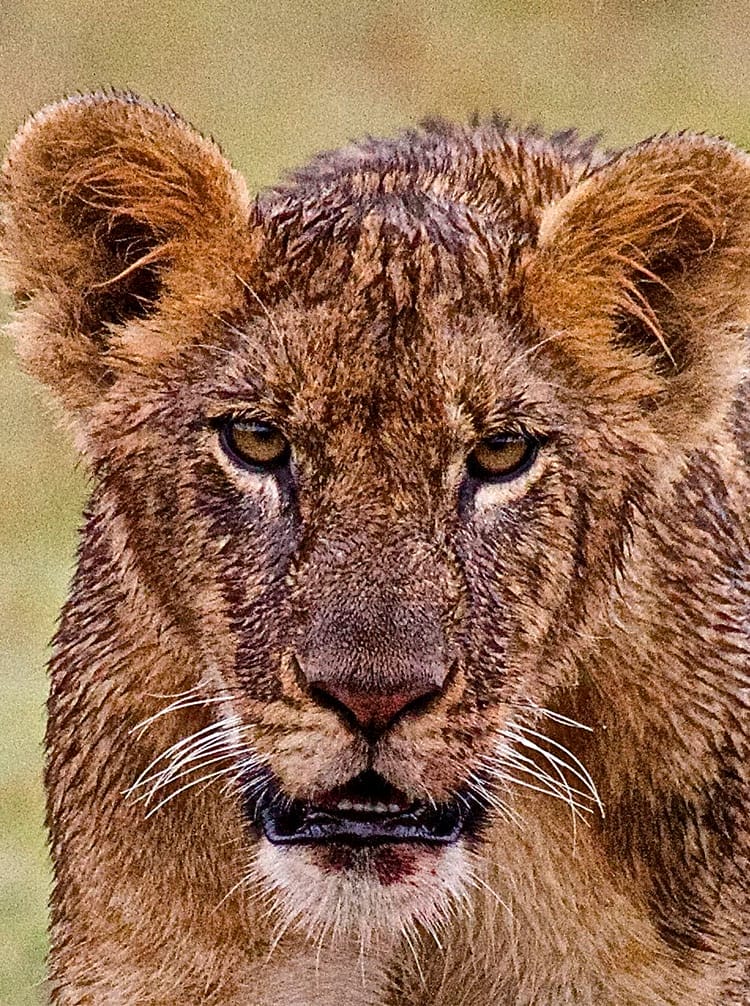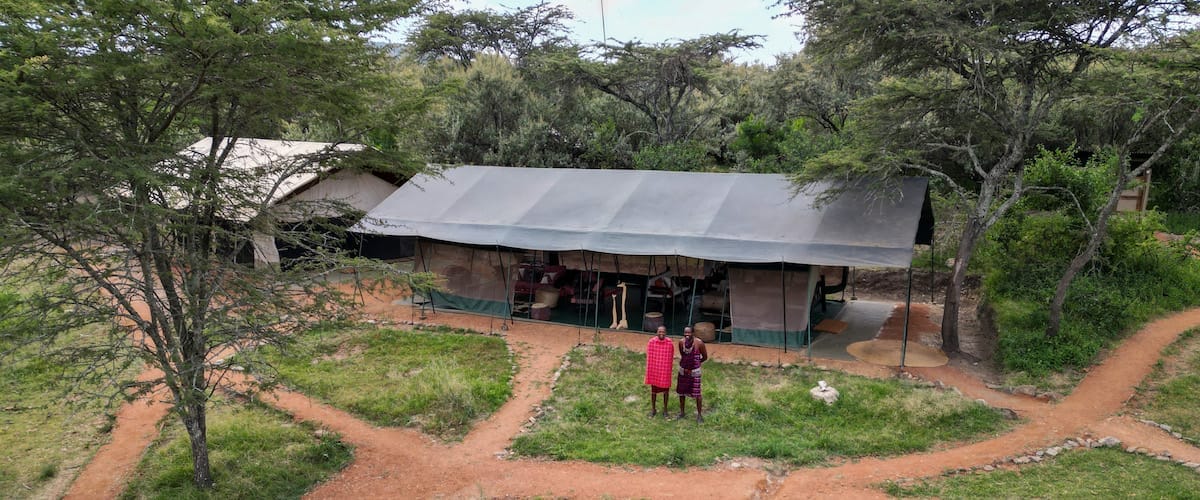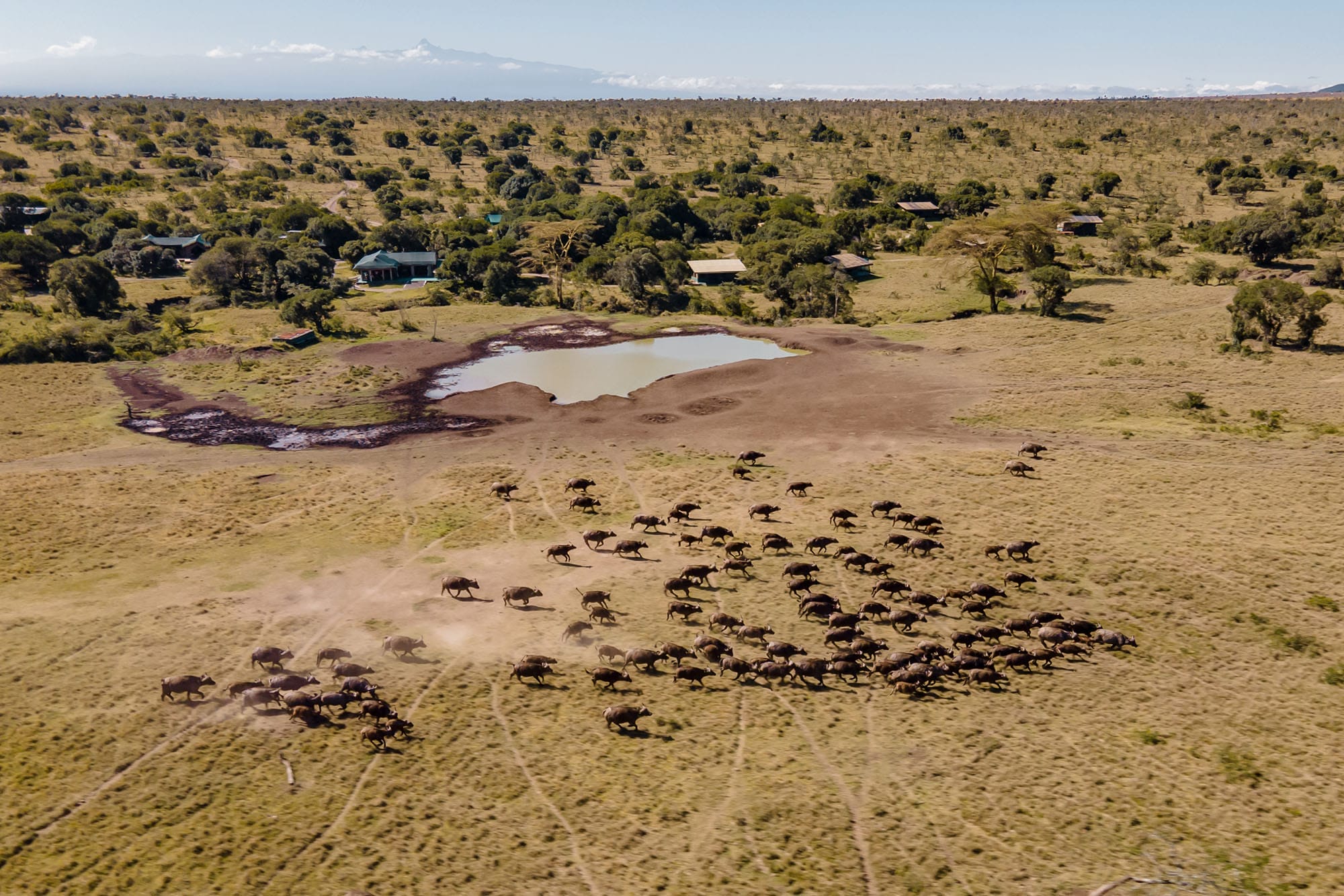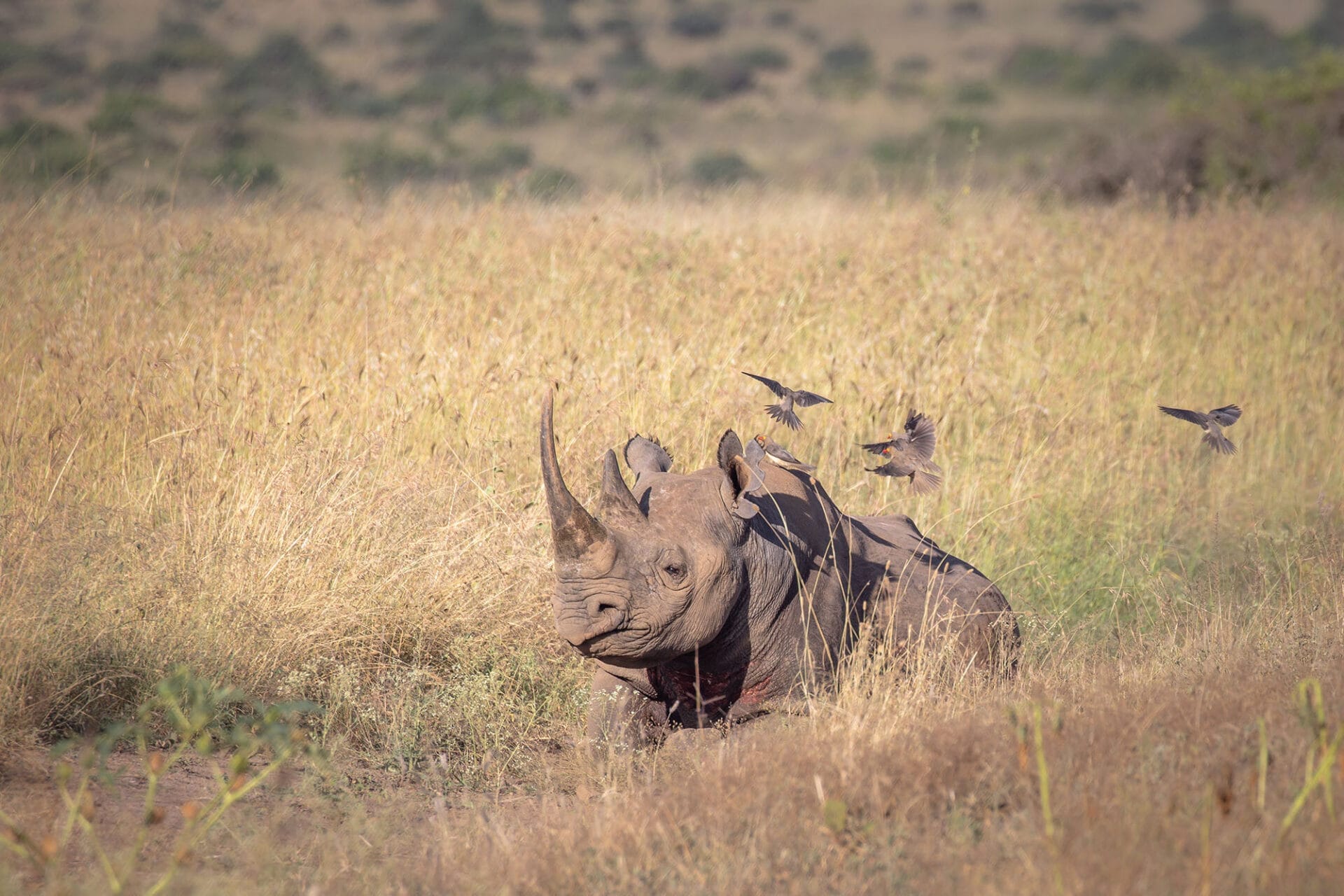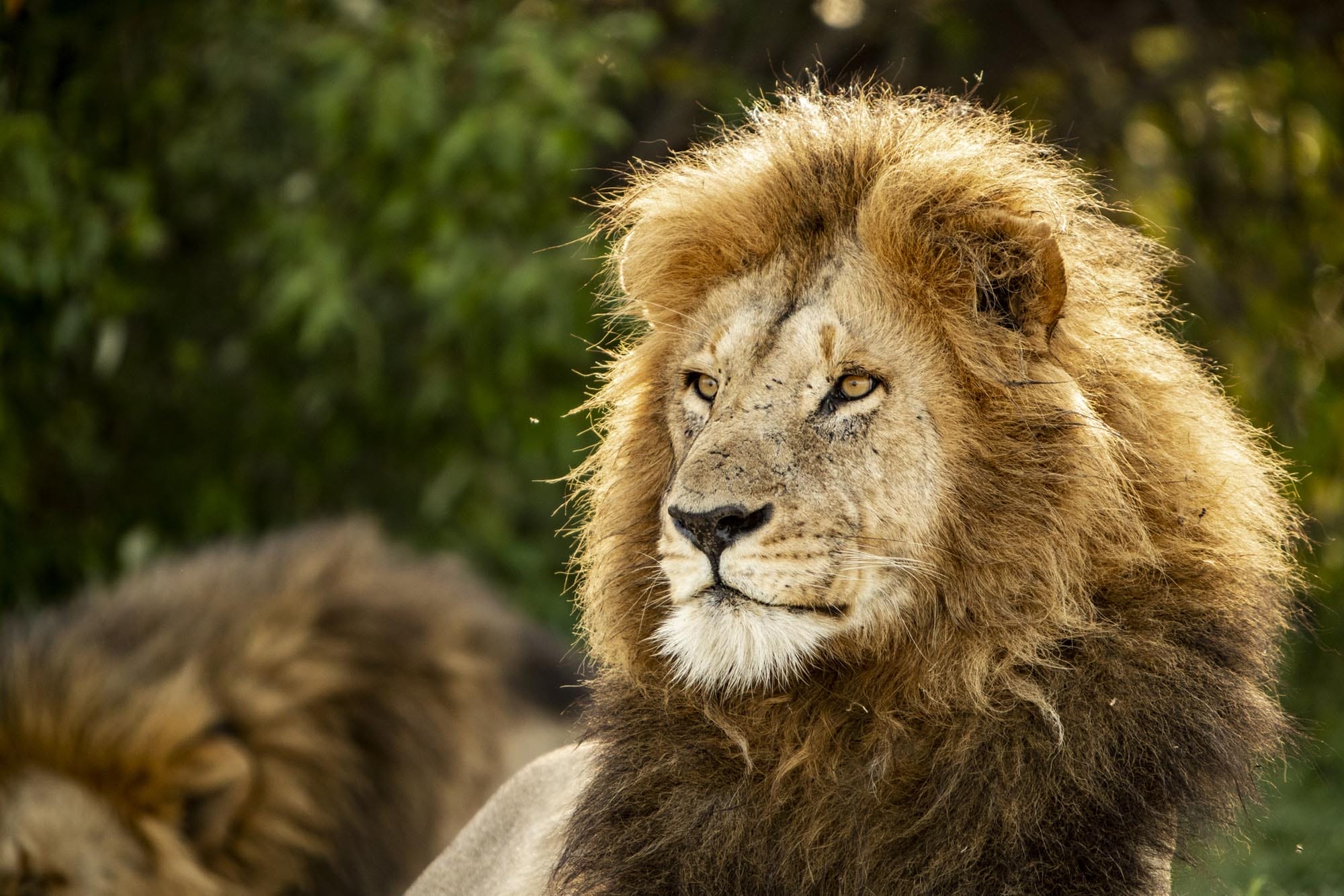Kenya Travel Information
Everything you need to know to plan your safari to Kenya — from the best time to visit and visa requirements to health advice, packing tips, money, and connectivity. Whether you’re heading to the Maasai Mara, Amboseli, or the Kenyan coast, this practical guide will help you prepare for a seamless and unforgettable safari experience.
Tanzania's month-by-month visit guide
Visiting in January
The Great Migration herds have reached the southern Serengeti, spreading out for calving amid warm, dry weather—a prime time for safaris. Mount Kilimanjaro climbs are feasible, though the peak may be crowded. Coastal Tanzania, including Zanzibar, offers an idyllic tropical beach escape. Inland, Tarangire, Serengeti, and Ngorongoro Crater showcase the Great Migration. The weather is hot and sunny, ideal for safaris and witnessing wildebeest calving. Climbing Kilimanjaro remains favorable. Coastal and inland regions together present diverse opportunities for an unforgettable Tanzanian experience.
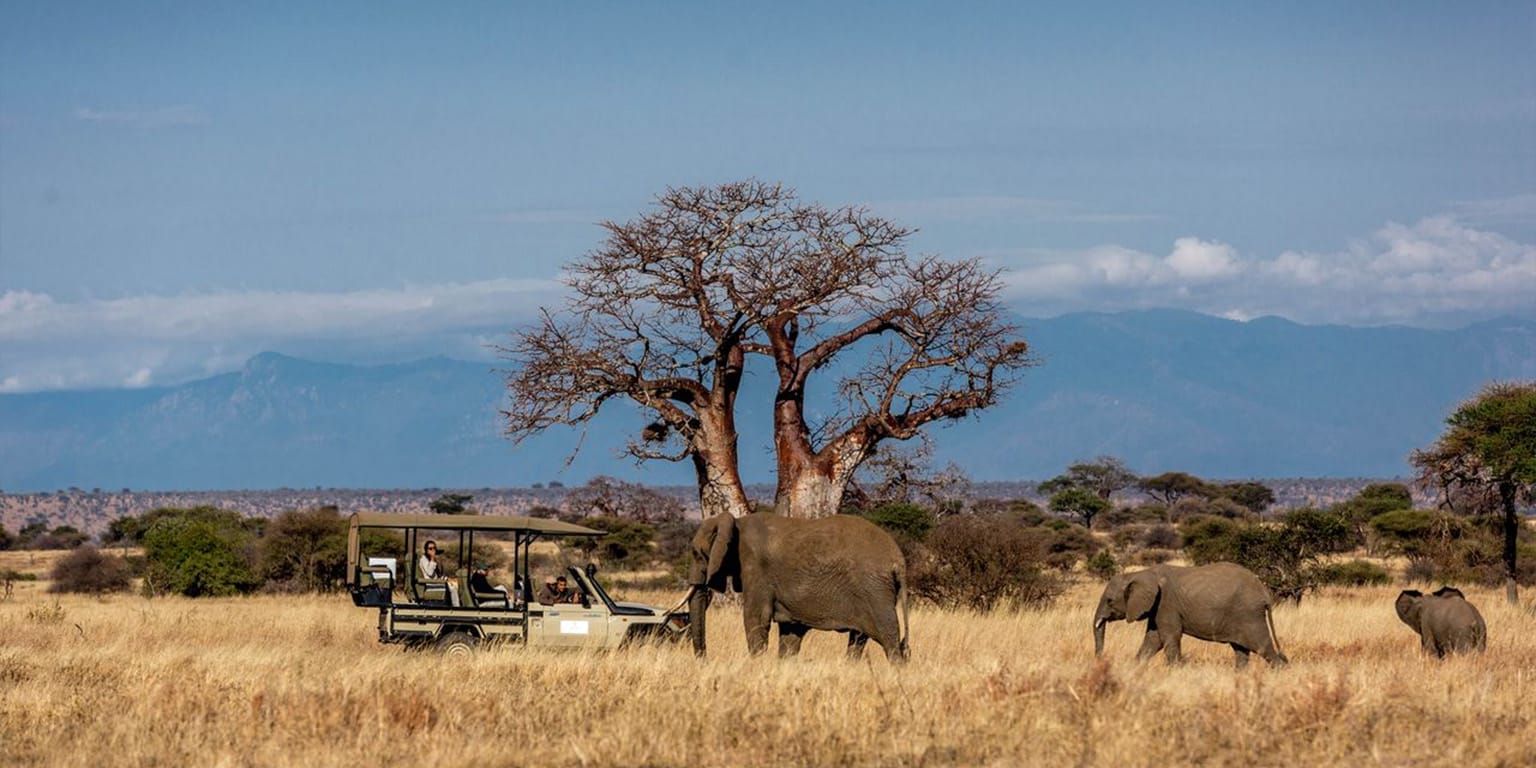
Visiting in February
The calving season kicks off in the Serengeti and Ngorongoro Crater, with thousands of wildebeest giving birth, drawing in active predators. Approximately 500,000 wildebeest calves are born in this period. The weather is hot and sunny, perfect for safaris, with a chance to witness calving in the southern Serengeti. Climbing conditions on Kilimanjaro are favorable. The February Great Migration in the Serengeti sees most wildebeest calving in a 2-3 week window, offering abundant predator sightings. The landscape is lush after short rains, making it an opportune time for climbing Kilimanjaro, though it may be crowded.
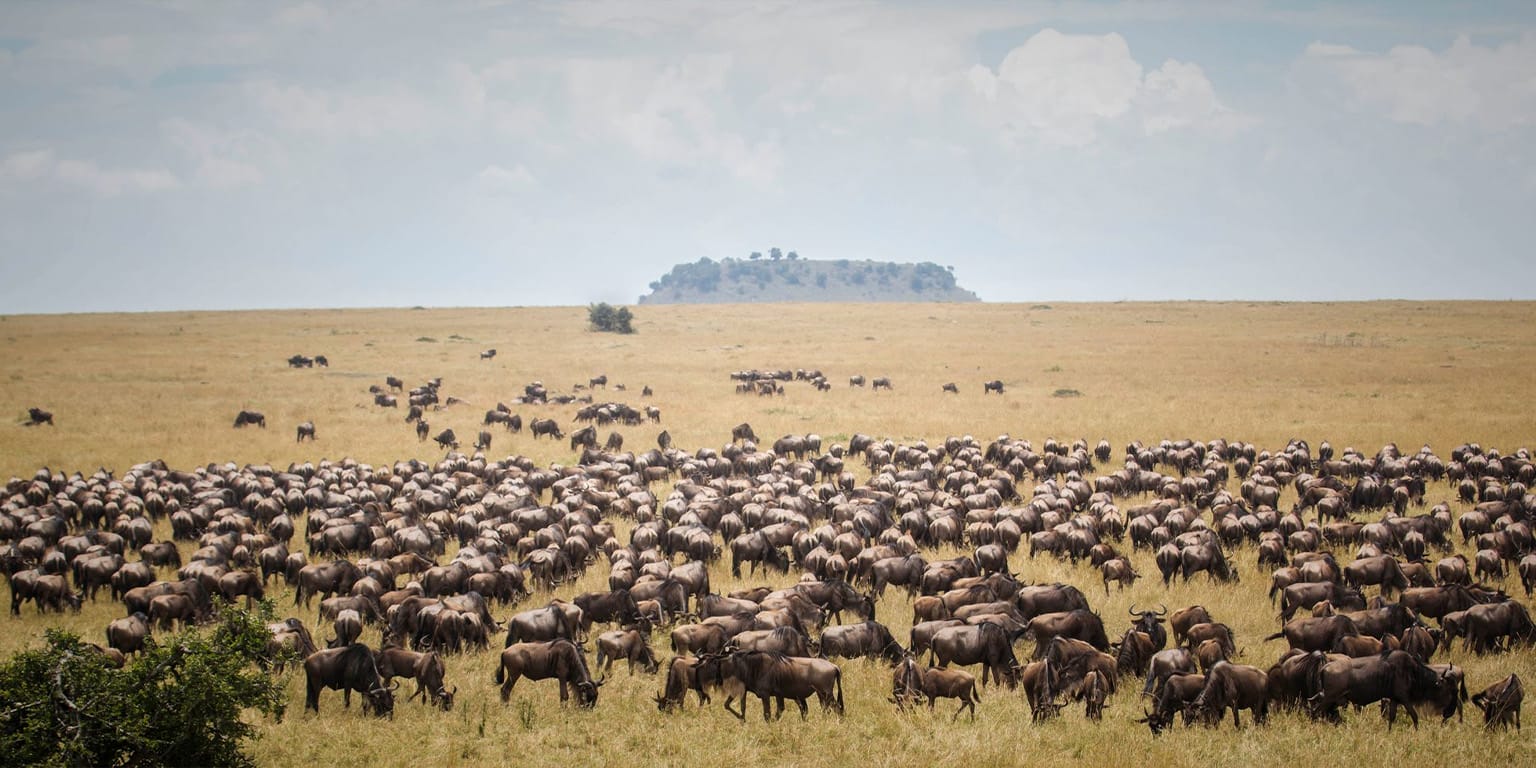
Visiting in March
In March, the long rains season commences, transforming the landscape into lush terrain in the Ngorongoro Highlands with short, sharp afternoon rainfall. This period is ideal for Mount Kilimanjaro expeditions, although wildlife viewing may become challenging due to the rainy season. Meanwhile, in Serengeti, the Great Migration begins its northward movement, providing a less crowded experience.

Visiting in April
Tanzania experiences its primary rainy season peak in April with intense, continuous precipitation. Afternoon thundershowers and nocturnal storms are frequent, particularly in western and southern parks with high humidity. Despite wildlife dispersal due to rainfall, the Southwest Serengeti hosts the wildebeest rut, a notable highlight. April poses challenges for travel with muddy roads, affecting safari accessibility. However, this off-peak period offers discounted prices and fewer crowds, making it an economical time for those seeking value and tranquility in Tanzania tours and accommodations.

Visiting in May
In May, a mix of heavy rain and the conclusion of the rainy season affects inland areas. While early May remains wet, the latter part experiences drier conditions as the dry season begins in June. The Great Migration shifts from the southern Serengeti to the western corridor. Wildlife viewing is challenging, but the northern region offers good safari opportunities. Kilimanjaro climb conditions improve. The wet season persists, fostering active wildlife. This period is ideal for birdwatching and photography, capturing vivid colors in the skies as the long rains season concludes.

Visiting in June
In June, Tanzania enters its dry season, heralding prime conditions for luxurious safaris. The conclusion of the rainy season transforms the savannah from green to yellow, amplifying wildlife sightings. This period is ideal for Kilimanjaro treks. Moreover, June marks the onset of the Great Migration, potentially witnessed at the Grumeti River with animals preparing for daring crossings. The game reserve roads also dry out, facilitating easier travel for unforgettable safari experiences, especially in the Serengeti where the Great Migration unfolds.
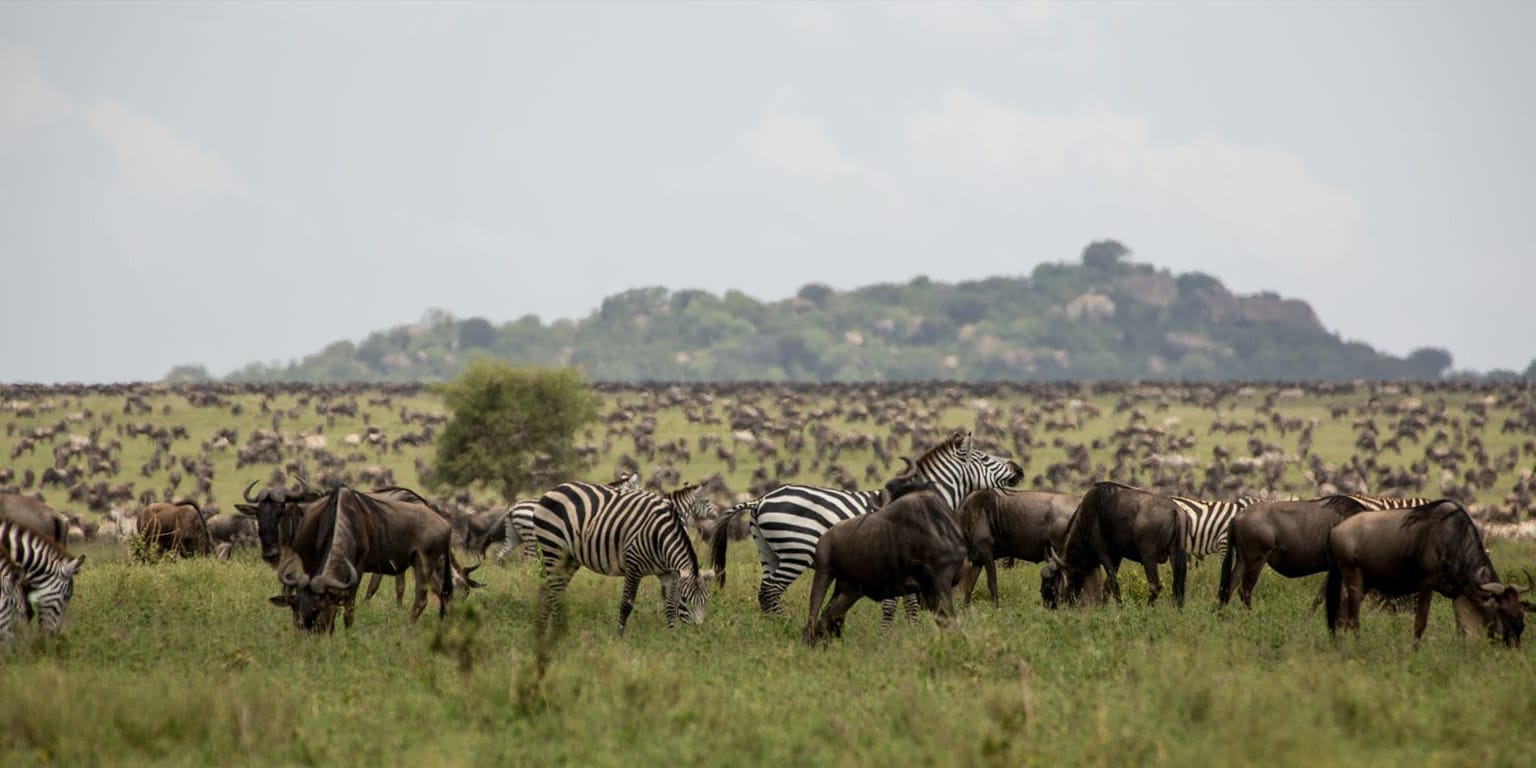
Visiting in July
July is the prime safari season in Tanzania, characterized by optimal weather and exceptional game drive opportunities. It’s an ideal period for combining Kenya and Tanzania safaris. The northern Serengeti hosts the Great Migration, as wildebeests prepare for Mara River crossings into Kenya. The month promises excellent weather, abundant sunshine, and minimal rainfall, enhancing wildlife viewing experiences. However, visitor traffic is high, particularly in core areas. Traveling in July offers superb weather, bustling game drives, and a front-row seat to the spectacular Migration, albeit with increased tourist activity.

Visiting in August
Tarangire offers excellent game viewing amidst the stunning backdrop of iconic baobab trees, providing a less crowded alternative to the Serengeti. August is a bustling period in Tanzania’s northern safari circuit and Zanzibar, featuring vibrant wildlife and the Great Migration crossing the Mara River. Despite high visitor traffic, it’s an optimal safari season with exceptional wildlife viewing. Mount Kilimanjaro is climbable, though crowded. Tarangire becomes a haven for elephant sightings, and Tanzania’s lake regions initiate the fishing season in September.

Visiting in September
In September, tourist crowds dwindle, making it an excellent time to visit Tanzania. Lower humidity and decreased mosquito activity enhance the experience. Mount Kilimanjaro conditions are optimal for hikers, while Tarangire National Park provides exceptional elephant sightings. Tanzania’s great lake regions usher in the fishing season. The Serengeti hosts the ongoing Migration, with the chance to witness thrilling river crossings. Climbing Kilimanjaro is favorable, though crowded. Tarangire remains a prime location for elephant viewing. Overall, September promises superb weather and wildlife sightings around permanent water sources.

Visiting in October
October in Mahale Mountains National Park offers prime chimpanzee encounters amid the onset of the first rains and thundercloud development. Lake Tanganyika reaches its warmest, perfect for aquatic pursuits. Arusha National Park becomes ideal for Mount Meru climbs, benefiting from excellent dry season weather. The month promises outstanding wildlife viewing around water sources. Kilimanjaro conditions are favorable, with lower visitor traffic. The end of the dry season in other areas provides optimal wildlife viewing, as short grass and scarce water concentrate animals. Thunderstorm clouds signal the imminent arrival of the rainy season.

Visiting in November
November is an underrated month for a Tanzanian safari, featuring periodic thundershowers in the afternoon. While weather can be unpredictable with the start of short rains, the northern parks offer excellent year-round game viewing. It’s an ideal time for off-the-beaten-track exploration. Kilimanjaro conditions may be challenging, but low visitor traffic is an advantage. The short rains season begins in November, marked by afternoon thunderstorms, creating a low season with favorable rates. The Serengeti sees the return of massive herds, following rains that spur new grass growth in the southern plains.

Visiting in December
In December, Tanzania experiences the ‘short rains,’ with the month’s initial period being tranquil before the festive season. Ideal for birdwatching, migratory birds populate Nyerere and Tarangire National Parks. The Great Migration returns to the southern Serengeti, perfect for witnessing the preparations for calving. Weather improves, though unpredictability persists. Wildlife viewing is optimal with the migration in the southern Serengeti. Kilimanjaro conditions vary. The first half of December is serene, contrasting the lively Christmas and New Year period. Tarangire remains a haven for bird enthusiasts, and the short rains conclude by month-end.

Getting There
The main international airport of Tanzania is:
Julius Nyerere International Airport in Dar es Salaam – (DAR)
Kilimanjaro Airport (JRO) is also frequently used, especially when arriving from neighbouring African countries.
You can check your best flight route here
Security & General Travel Safety
Our head office is based in Nairobi and we work with reputable safari companies who are located on the ground in Tanzania These companies are the eyes and ears on the ground and can inform our head office in Nairobi of any security situation as it may happen, ensuring that we can act and respond swiftly.
Other general travel safety advice:
- In the cities and main tourist areas, be on the alert for handbag snatchers and pick pockets.
- Do not travel with any precious jewellery items.
- Make copies of your travel documents and keep these in a safe place – separate from the original documents.
- Split out cash into separate bundles of small amounts and keep separately.
- Ensure that luggage can be locked.
- Always wear sear belts whilst traveling in vehicles and ensure doors are locked.
Currency
Tanzania Shilling is the currency used in Tanzania but US$ are also widely used and are easier to travel with. However please note that travelers are required to declare international currency valuing more than $10,000 on both entrance and exit from Tanzania.
Ensure to travel with lower denomination notes, as change given from high tender notes may not be easily available.
When tipping, do so in US$.
Many camps/lodges will be pre-paid before your safari, with tips needing to be settled upon departure. If you do need to settle something to a bill, please be aware that some camps/lodges in remote areas may not accept credit/bank cards, so it is advised to have enough US$ in cash to cover any additional costs.
Always inform your bank that you are travelling outside of the country as they might block any attempt to withdraw cash or use card machines if they have not been informed beforehand.
Non-residents (except Kenyans and Ugandans) may not import or export Tanzanian Shillings (TZS)
Tips & Gratuities
Tipping is entirely at your discretion and although it is not a requirement it is customary to tip for good service. There is not a set amount to tip, so please take the following information as a guideline:
Guides – US$10-$20 cash per person /per day
Camp Staff Team – US$10-$20 per person / per day
Camp Host – US$10-$20 per person / per day
Tips should be given in US$ cash and it is usual to tip at the end of your stay.
Some camps/lodges will have a tip box for the camp staff team.
Health Information
Malaria:
It is advised that visitors take malaria precautions when travelling to Tanzania. It is recommended that you contact your Doctor or Travel Health Clinic at least 6-8 weeks prior to travel.
You can reduce the risk of malaria by using prophylactics (which should be started before arriving in Tanzania and under your doctor’s guidance) and by following these simple procedures:
- Wear long sleeves and long trousers to avoid bites from mosquitos, insects and ticks.
- Apply mosquito repellents on a regular basis to exposed skin.
- Where possible sleep under a mosquito net.
- Burn an insect/mosquito repellent candle or coil.
All travellers should be aware of the signs and symptoms of malaria and should be advised to seek immediate medical attention if these occur either whilst abroad or up to a year after their return. Speak to your Doctor or Travel Health Clinic for more information.
Vaccinations:
Yellow fever required if traveling from a yellow fever endemic country.
The recommendations regarding vaccinations & anti-malaria tablets need to be discussed with a professional, therefore it is advised that you contact your Doctor/medical centre/ travel health clinic for up-to-date details, this should ideally be done at least 8 weeks before you travel.
Drinking Water & De-Hydration
Do not drink water straight from the tap, always drink from bottled water.
Also avoid ice as this may be used from tap water,
Brush teeth with bottled drinking water.
De-Hydration
Always take a bottle of drinking water in your day bag on any activity or excursions – even if it’s a short one – and take regular, small drinks of water.
Wear a hat and sunscreen at all times and cover up/take shade from the heat of the sun, especially during the hottest times of the day.
Bites & Stings
Bugs and small creatures are all a part of being in the wilds of Africa. It is of course important to take precautions against any opportunity for bites or stings, so being aware is important.
When walking in the bush always wear long trousers and enclosed shoes or walking boots , with thick socks covering the ankles for protection. When walking in long grass, check your legs and clothes for grass ticks – especially in the rainy season, even when you are wearing long trousers.
Check & shake out shoes and walking boots before putting them on.
Always look first to see where you are sitting, when picking something up or when putting your hand/foot into something, like a bag or shoe – check first!
If you think you may have been bitten or stung by something, always inform the Camp Manager & Safari Guide as soon as possible.
Internet, Electricity and Plug Standards
Internet availability and wifi can be sporadic whilst on safari in Tanzania. It is best to think of this trip as an opportunity to take a break from the world of tech and reconnect to nature. If necessary, we can check each camp individually if there is a wish to know if it has an internet connection.
Tanzania operates on a 230V supply voltage and 50Hz. Solar power is also common in safari locations.
Tanzania uses plug types D and G.
Climate
Tanzania has a long rainy season which happens from March – May. Some locations are not so easily accessed during these months and safari camps can be seasonally closed.
The green season in June is usually when the rains have finished but the landscape is still lush and green.
July – October are the dryer months, when safari viewing can be at it’s best but the temperatures are hotter before the rains begin again. This is peak safari season and it is advised to book well in advance.
Nov & December brings the shorter rainy season, when afternoon downpours are frequent but tend only to be for a couple of hours.
January – February are the hot and dry months.
Visa & Passport Requirements For Entry
PASSPORT
- Passport valid for a least 6 months from your date of entry.
- Return ticket to your country (or enough money to buy one).
- Sufficient funds to cover your stay in Tanzania.
- Enough blank pages (a min of 3) in your passport to fit the required entry visa.
VISA:
Visitors who require a Visa can apply for one on arrival into Tanzania, but this can be a lengthy process. We advise our clients to apply online for a visa in advance so that they have this before arrival. To check the latest Visa requirements and to apply click here
Clothing Suggestions
Pack lightly for your safari to include:
- Comfortable, loose fitting cotton clothing in muted and natural tones is recommended.
- Long sleeves and long trousers, shorts and t-shorts with enclosed footwear.
- Jacket or fleece for early mornings and evenings, when it can get chilly.
- Hat to keep the sun off and protect from sunburn.
- Small day pack to hold water bottle, binoculars, notebook and pen, sunglasses, face/hand wipes etc
- Please note that camouflage-patterned clothes are illegal, so avoid any item like this.
See here for our full clothing packing guide
Travel Insurance
All travellers must have adequate and comprehensive travel health insurance. Make sure your travel insurance covers all the activities you plan on doing in Tanzania and covers your full stay in the country and travel to/from.
Quick Facts
Time Zone
GMT + 3
Currency
Kenya Shillings
International Airports
Nairobi / Mombasa
Best Time
June-October
Malaria
Malaria zone
Language
English & Kiswahili
Quick Facts
Time Zone
GMT + 3
Currency
Kenya Shillings
International Airports
Nairobi / Mombasa
Best Time
June-October
Malaria
Malaria zone
Language
English & Kiswahili
Kenya's month-by-month visit guide
Visiting in January
January, the peak of Kenya’s summer, is an ideal month for game viewing. It falls between the ‘long’ and ‘short’ rain seasons, offering pleasant conditions. While temperatures are high, occasional showers provide relief, and the landscape is lush with post-November and December rains. Coastal areas boast sunny days and crystal-clear seas, making it perfect for beach holidays. Whether you’re into wildlife safaris or seaside relaxation, January offers an excellent balance of both experiences in Kenya.
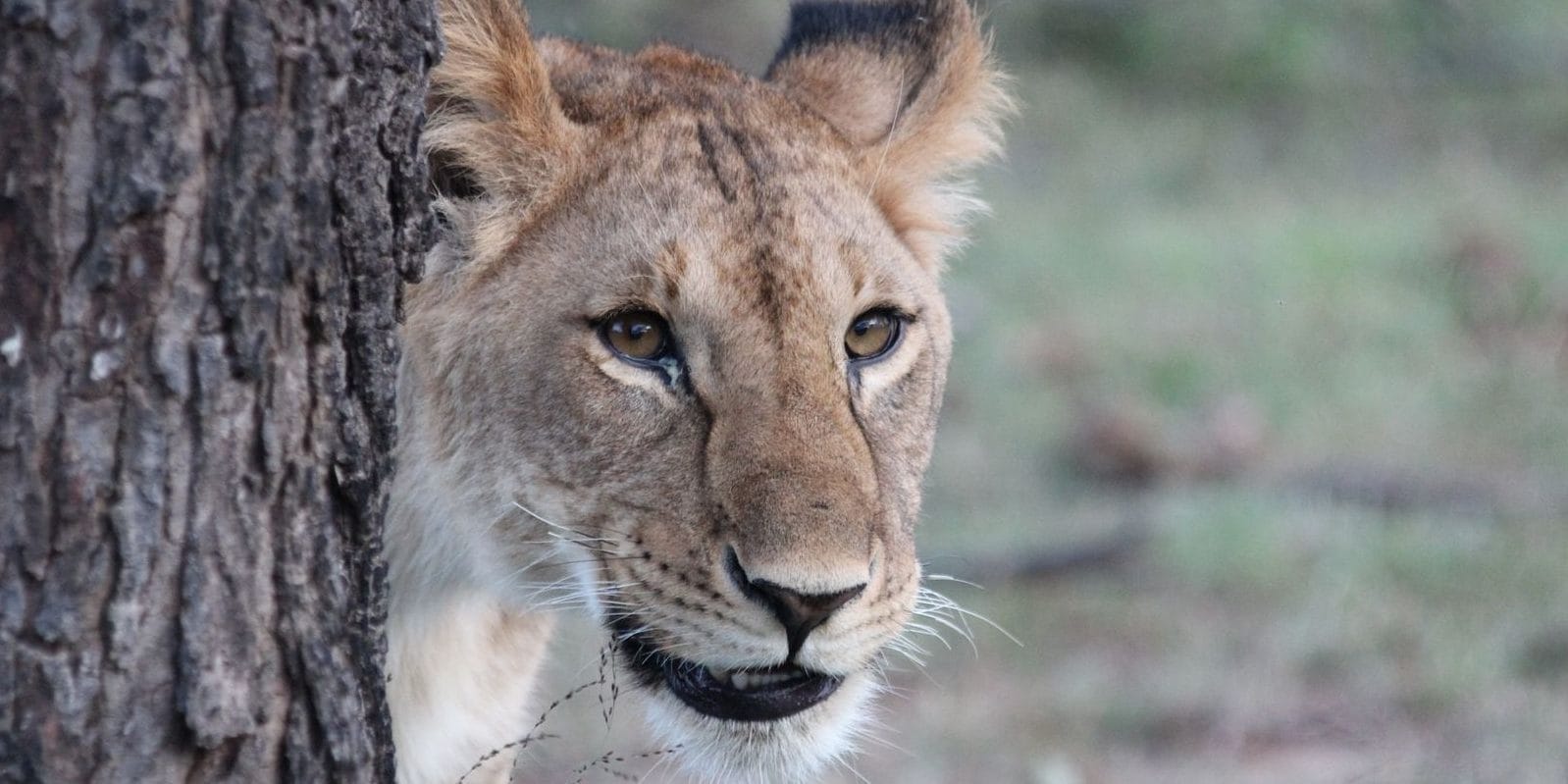
Visiting in February
February is a prime time for a Kenya safari. The central highlands offer warm days and cool evenings, while the coast boasts scorching daytime heat that continues into the evening. The Masai Mara experiences minimal precipitation, making it ideal for wildlife sightings at watering holes. This month is perfect for conquering Mount Kenya, Africa’s second-highest peak. Additionally, in the conservancies, February sees the resident wildebeest calving, providing a captivating spectacle.

Visiting in March
March brings a swift transition in Kenyan weather, shifting from ‘hot and dry’ to ‘wet and rainy’ by month’s end. While rain becomes widespread, it transforms the savannah into a muddy terrain, occasionally impacting accessibility. On the bright side, this period offers the advantage of fewer crowds and cost savings. Despite increasing rainfall as the month progresses, game viewing remains favorable. As Kenya approaches the ‘long rains,’ wildlife sightings are still rewarding.
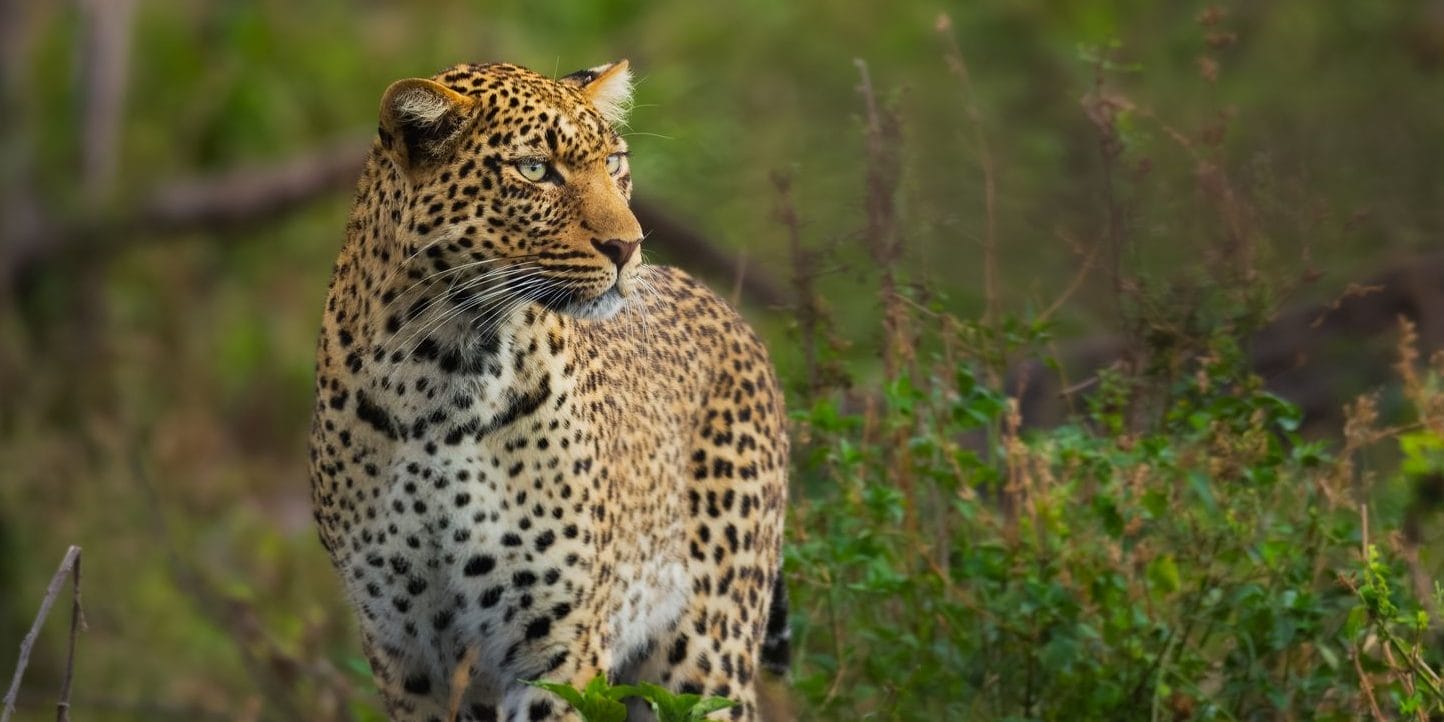
Visiting in April
April is among Kenya’s rainiest month. Nairobi and the central highlands offer hot days and comfortable nights, while Mombasa remains consistently hot. The lush, green landscape and rain-washed skies create an ideal backdrop for photographers, with minimal dust. Game drives can be challenging due to muddy roads, but it’s a fantastic time for capturing wildlife in stunning detail. Just ensure your equipment stays protected from the elements.
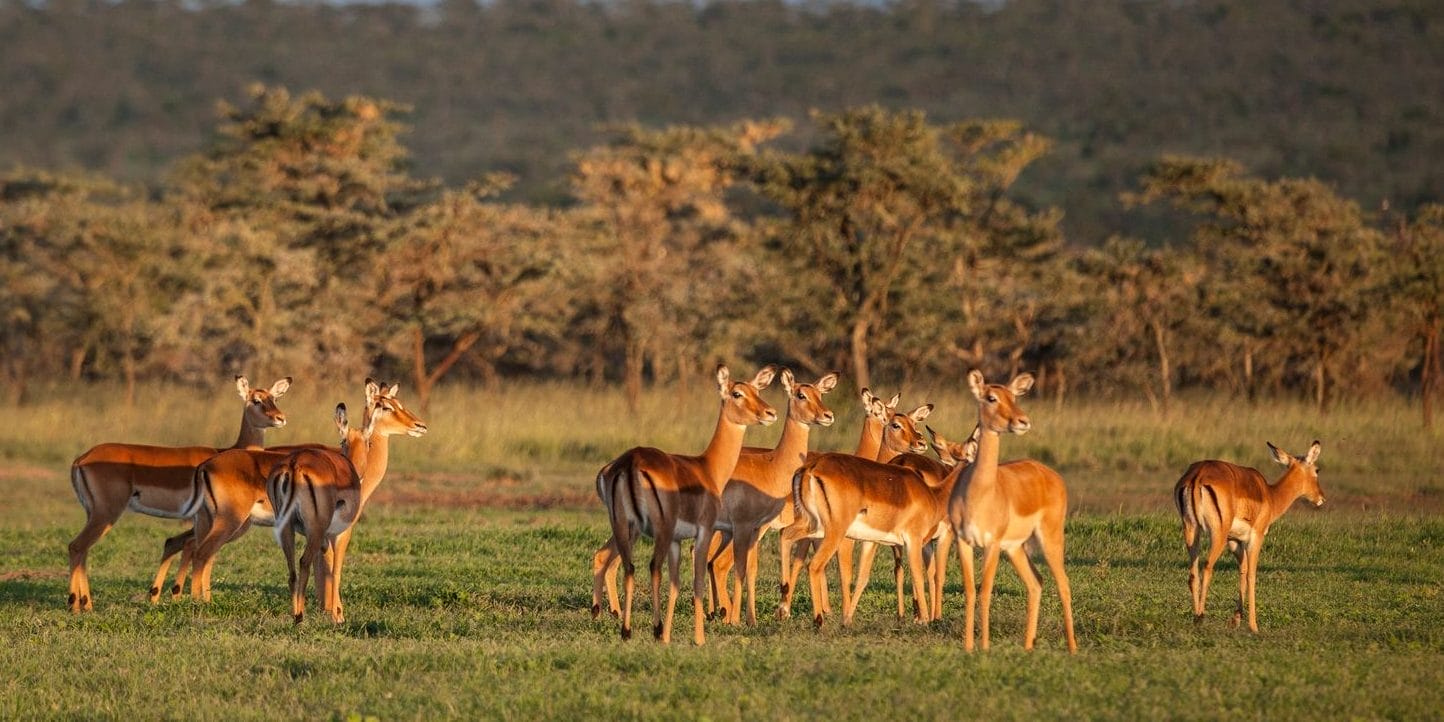
Visiting in May
May in Kenya brings mixed blessings for travelers. While it marks the long rains, leading to heavy downpours and challenging wildlife sightings, it also translates into quieter properties and budget-friendly accommodations. The lush landscapes, adorned with vibrant flowers, beckon safari enthusiasts, although spotting wildlife amidst tall grasses becomes more of a game. However, for sunseekers, it’s not the ideal time, especially as coastal beaches lose their sunny charm during this wet season.
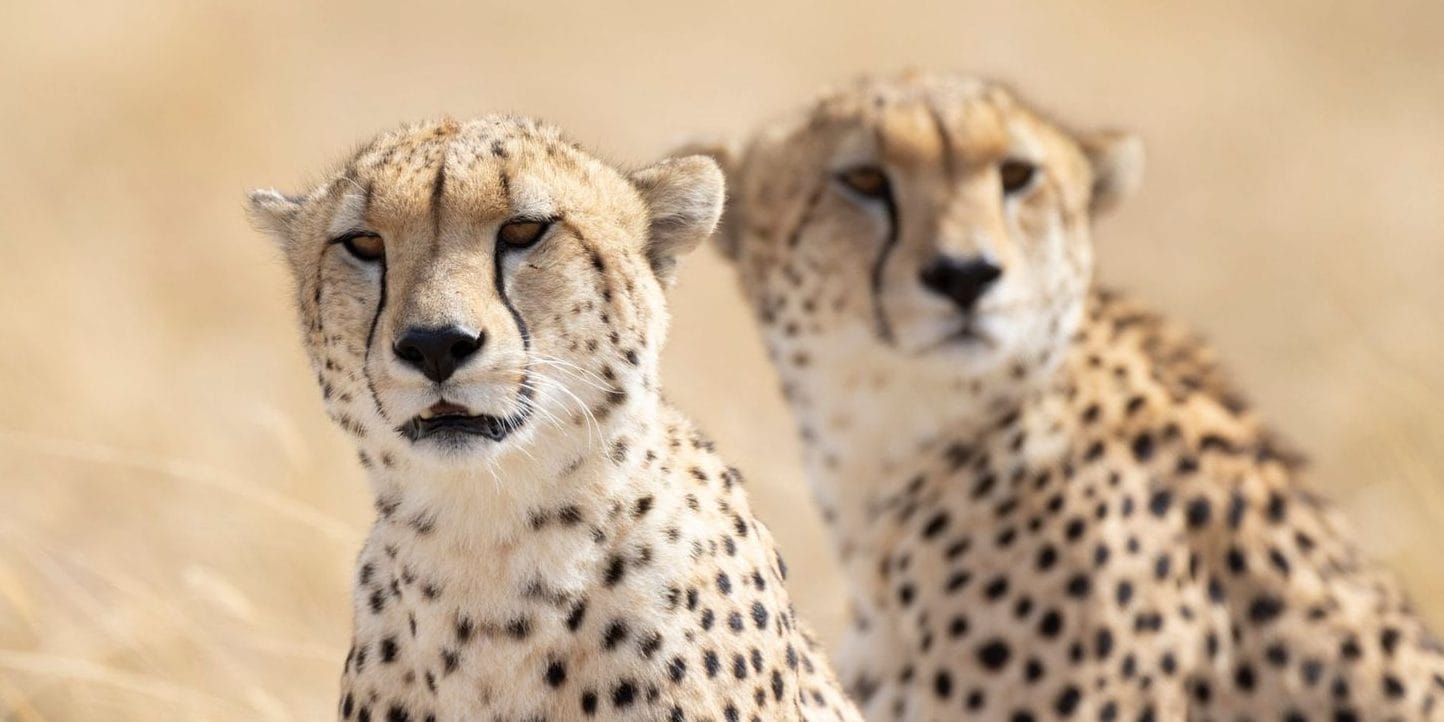
Visiting in June
In June, post-rain tranquility reigns, with occasional light showers and cool nights at higher altitudes. The lush grasses make wildlife spotting a delightful challenge. As anticipation mounts, the Great Migration’s imminent arrival in the Masai Mara adds to the allure of this beautiful season.
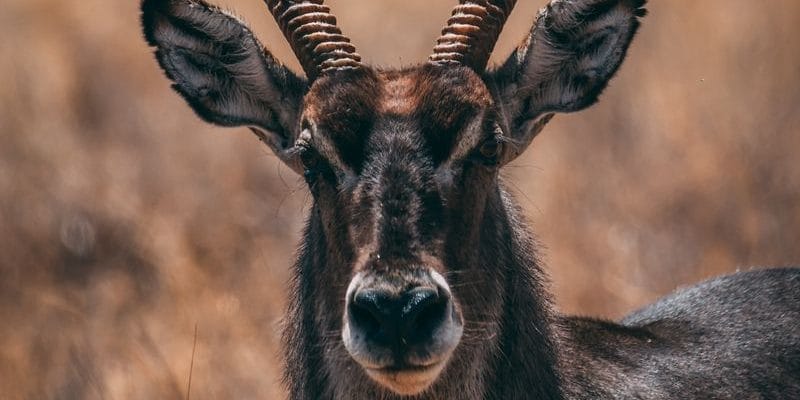
Visiting in July
July offers a favorable climate in Kenya, with temperate, mostly dry conditions that aren’t excessively dusty. Occasional showers remain possible, making it an ideal time to visit. It marks the lead-up to the peak travel and game viewing season, especially in the Masai Mara, where the awe-inspiring wildebeest migration typically begins. As July progresses, you can witness riveting river crossings, and the weather maintains its pleasant balance between dryness and occasional showers.
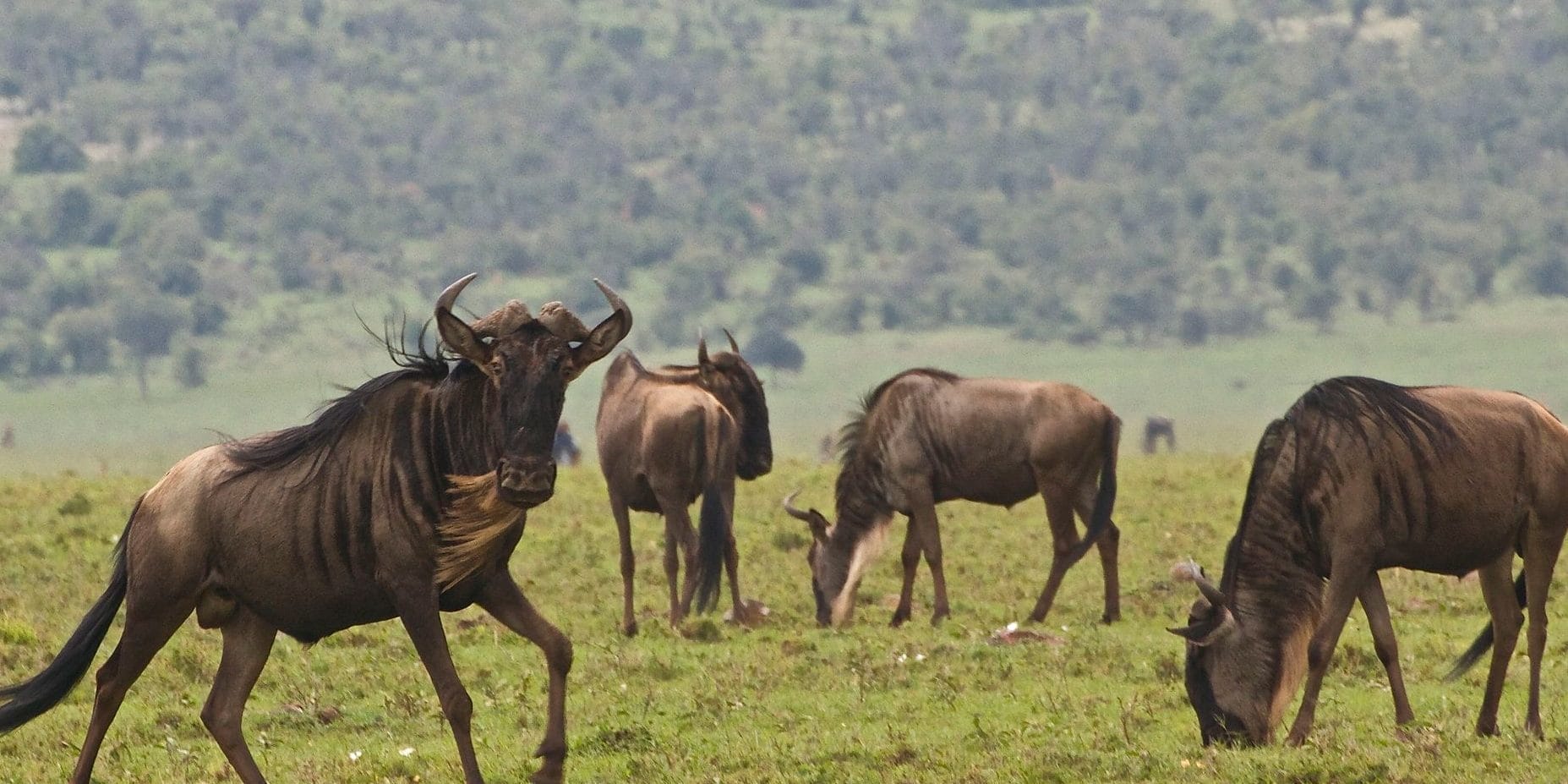
Visiting in August
In August, enjoy pleasant, mostly dry weather, making it an ideal time to visit. Across the parks, fantastic game viewing awaits, and the Masai Mara hosts the peak of the Great Migration. Witness thousands of zebras and wildebeest embarking on daring river crossings, while hungry crocodiles add to the suspense, creating awe-inspiring wildlife spectacles.
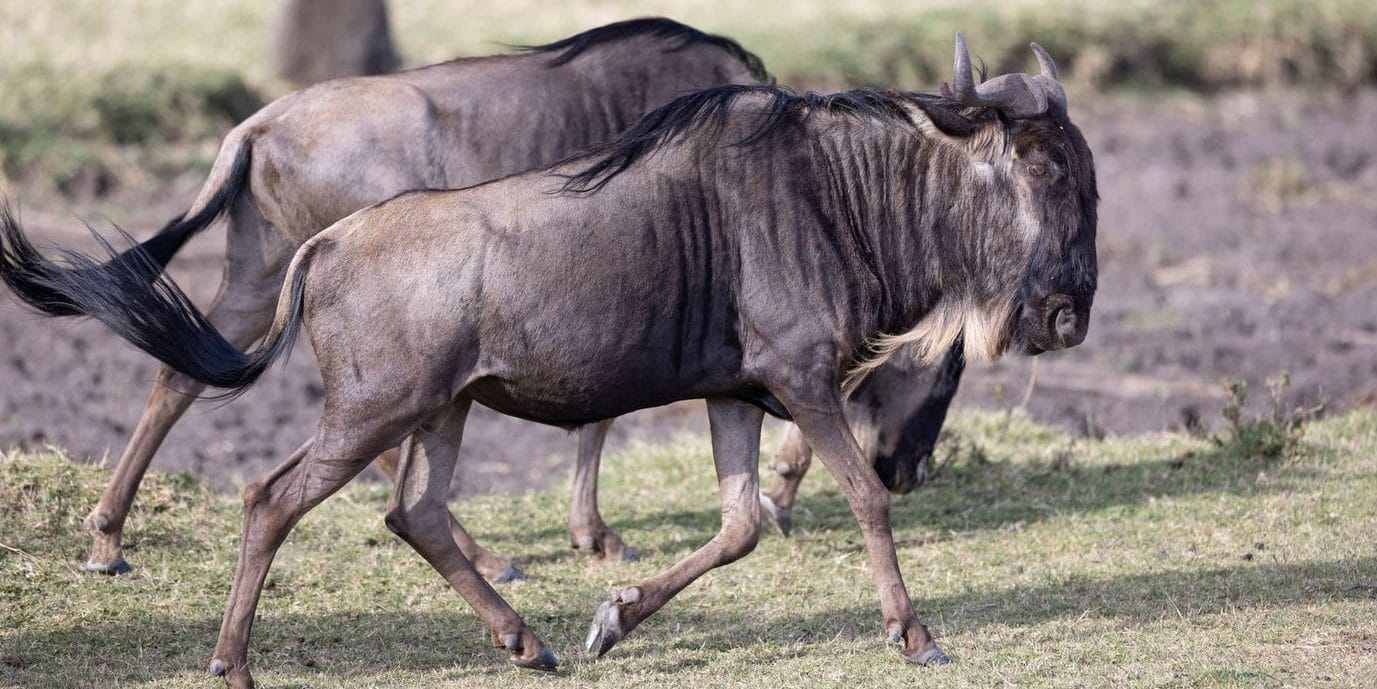
Visiting in September
September is the optimal time to explore Kenya, primarily due to the awe-inspiring Great Migration, where vast herds congregate in the Maasai Mara. This month marks the dry season, ensuring exceptional wildlife sightings as animals gather around limited water sources. While prices may peak, early reservations are advised, and September often surpasses July and August for availability. With clear skies, it’s a photographer’s dream, and the abundance of wildebeest entices predators, creating thrilling hunting scenes. Kenya in September promises dry, game-rich conditions, with the Mara region offering exceptional wildlife encounters that extend across the country.

Visiting in October
In October, as temperatures gradually increase, expect a chance of light showers. It’s an ideal period for a crowd-free yet rewarding journey with abundant wildlife sightings. While the migratory herds exit the Mara, resident populations ensure fantastic game viewing. Throughout Kenya, this season promises fantastic wildlife experiences in Big 5 territory.
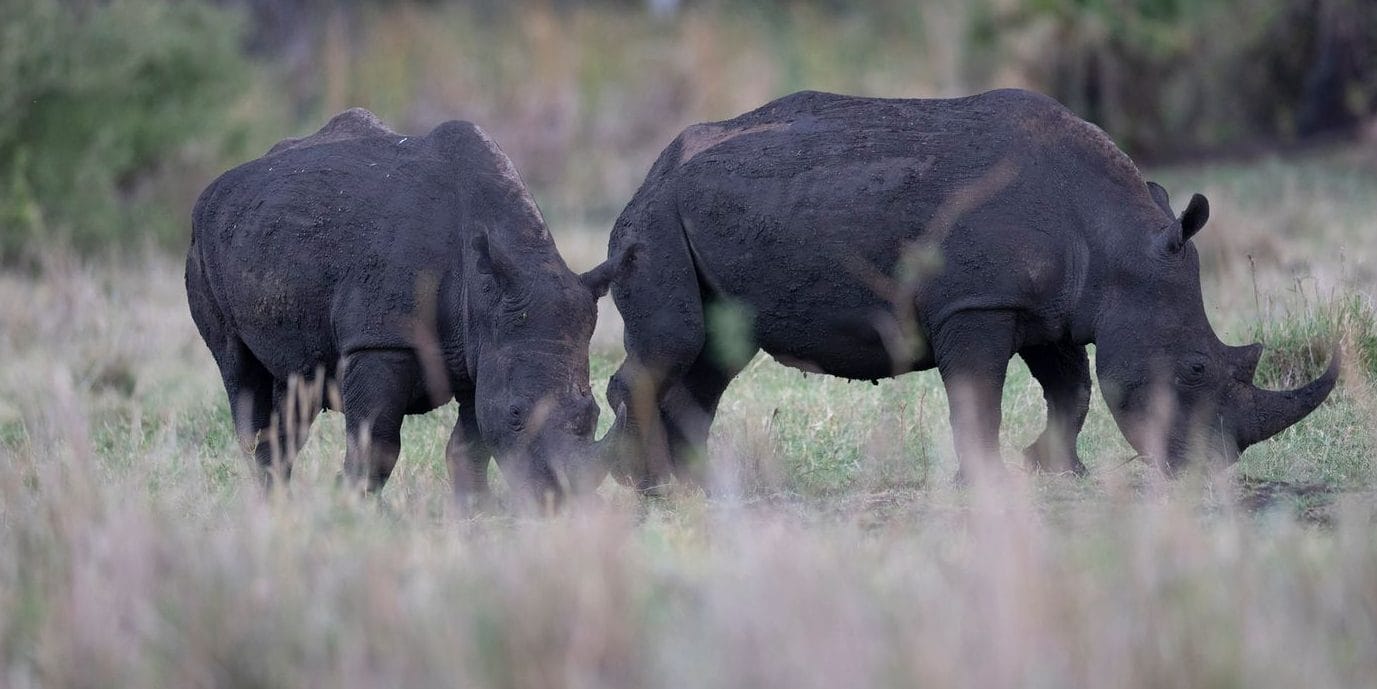
Visiting in November
November marks the onset of Kenya’s short rainy season. While most parks and camps stay open, a few on the Laikipia Plateau may close. This period sees higher temperatures, yet the Mara and other destinations continue to offer superb game viewing. With thinner crowds and enticing deals, it’s an ideal time for an affordable and less crowded Kenyan safari. Enjoy the wilderness without breaking the bank.
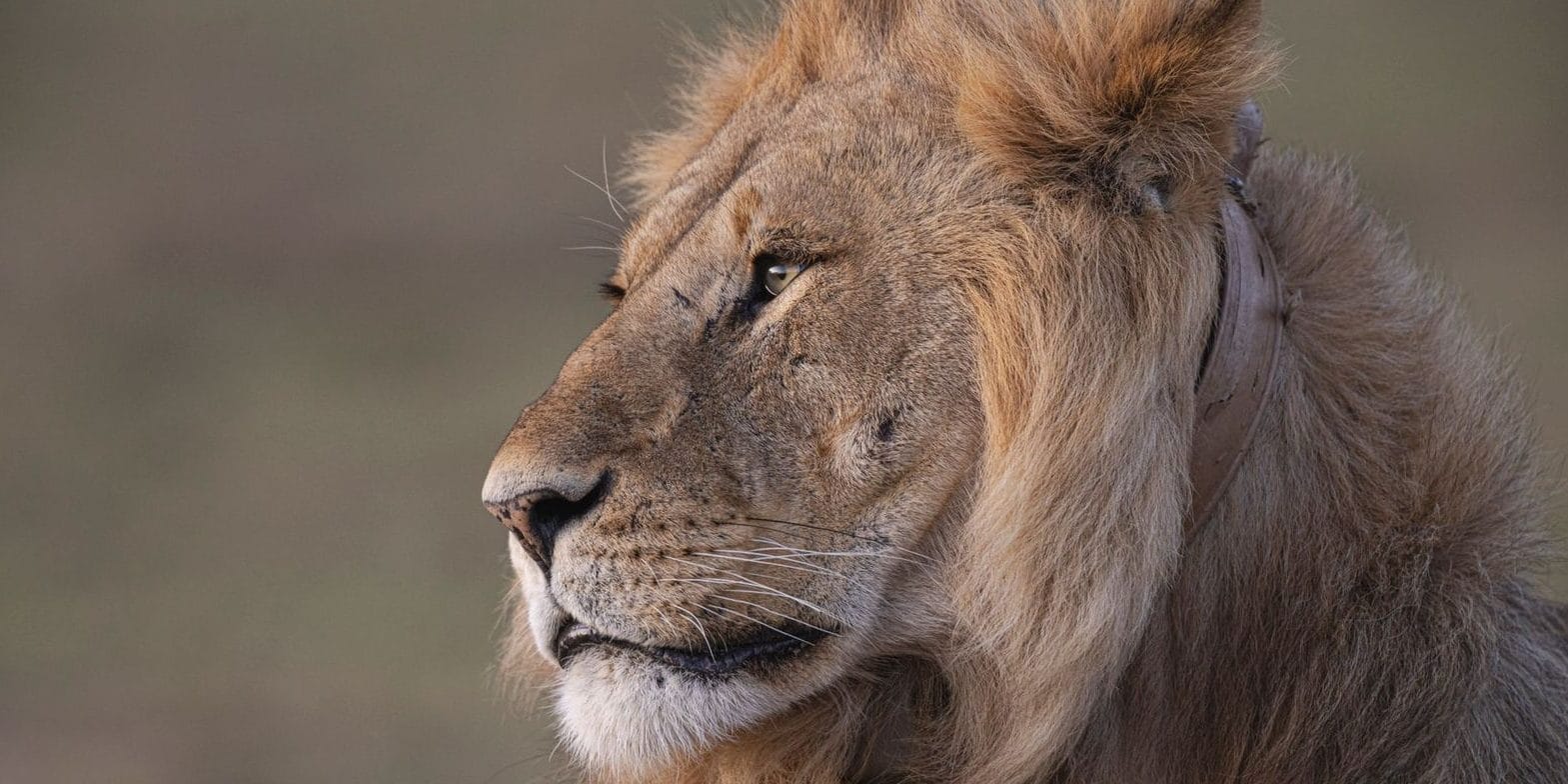
Visiting in December
In December, the final month of the year, the weather can be scorching with the chance of rainfall. Yet, the wildlife viewing remains consistently spectacular, while birdwatchers are in for a treat as bird populations significantly swell during this period.

Quick Facts
- Best Time for Wildlife Viewing: July to October — the dry season and Great Migration period in the Maasai Mara, offering the best game-viewing conditions.
- Best for Birding: November–April — migratory species and lush scenery.
- Best for Value: Green season, March–June and November — fewer visitors and vibrant landscapes.
Kenya's month-by-month visit guide
Visiting in January
January, the peak of Kenya’s summer, is an ideal month for game viewing. It falls between the ‘long’ and ‘short’ rain seasons, offering pleasant conditions. While temperatures are high, occasional showers provide relief, and the landscape is lush with post-November and December rains. Coastal areas boast sunny days and crystal-clear seas, making it perfect for beach holidays. Whether you’re into wildlife safaris or seaside relaxation, January offers an excellent balance of both experiences in Kenya.

Visiting in February
February is a prime time for a Kenya safari. The central highlands offer warm days and cool evenings, while the coast boasts scorching daytime heat that continues into the evening. The Masai Mara experiences minimal precipitation, making it ideal for wildlife sightings at watering holes. This month is perfect for conquering Mount Kenya, Africa’s second-highest peak. Additionally, in the conservancies, February sees the resident wildebeest calving, providing a captivating spectacle.

Visiting in March
March brings a swift transition in Kenyan weather, shifting from ‘hot and dry’ to ‘wet and rainy’ by month’s end. While rain becomes widespread, it transforms the savannah into a muddy terrain, occasionally impacting accessibility. On the bright side, this period offers the advantage of fewer crowds and cost savings. Despite increasing rainfall as the month progresses, game viewing remains favorable. As Kenya approaches the ‘long rains,’ wildlife sightings are still rewarding.

Visiting in April
April is among Kenya’s rainiest month. Nairobi and the central highlands offer hot days and comfortable nights, while Mombasa remains consistently hot. The lush, green landscape and rain-washed skies create an ideal backdrop for photographers, with minimal dust. Game drives can be challenging due to muddy roads, but it’s a fantastic time for capturing wildlife in stunning detail. Just ensure your equipment stays protected from the elements.

Visiting in May
May in Kenya brings mixed blessings for travelers. While it marks the long rains, leading to heavy downpours and challenging wildlife sightings, it also translates into quieter properties and budget-friendly accommodations. The lush landscapes, adorned with vibrant flowers, beckon safari enthusiasts, although spotting wildlife amidst tall grasses becomes more of a game. However, for sunseekers, it’s not the ideal time, especially as coastal beaches lose their sunny charm during this wet season.

Visiting in June
In June, post-rain tranquility reigns, with occasional light showers and cool nights at higher altitudes. The lush grasses make wildlife spotting a delightful challenge. As anticipation mounts, the Great Migration’s imminent arrival in the Masai Mara adds to the allure of this beautiful season.

Visiting in July
July offers a favorable climate in Kenya, with temperate, mostly dry conditions that aren’t excessively dusty. Occasional showers remain possible, making it an ideal time to visit. It marks the lead-up to the peak travel and game viewing season, especially in the Masai Mara, where the awe-inspiring wildebeest migration typically begins. As July progresses, you can witness riveting river crossings, and the weather maintains its pleasant balance between dryness and occasional showers.

Visiting in August
In August, enjoy pleasant, mostly dry weather, making it an ideal time to visit. Across the parks, fantastic game viewing awaits, and the Masai Mara hosts the peak of the Great Migration. Witness thousands of zebras and wildebeest embarking on daring river crossings, while hungry crocodiles add to the suspense, creating awe-inspiring wildlife spectacles.

Visiting in September
September is the optimal time to explore Kenya, primarily due to the awe-inspiring Great Migration, where vast herds congregate in the Maasai Mara. This month marks the dry season, ensuring exceptional wildlife sightings as animals gather around limited water sources. While prices may peak, early reservations are advised, and September often surpasses July and August for availability. With clear skies, it’s a photographer’s dream, and the abundance of wildebeest entices predators, creating thrilling hunting scenes. Kenya in September promises dry, game-rich conditions, with the Mara region offering exceptional wildlife encounters that extend across the country.

Visiting in October
In October, as temperatures gradually increase, expect a chance of light showers. It’s an ideal period for a crowd-free yet rewarding journey with abundant wildlife sightings. While the migratory herds exit the Mara, resident populations ensure fantastic game viewing. Throughout Kenya, this season promises fantastic wildlife experiences in Big 5 territory.

Visiting in November
November marks the onset of Kenya’s short rainy season. While most parks and camps stay open, a few on the Laikipia Plateau may close. This period sees higher temperatures, yet the Mara and other destinations continue to offer superb game viewing. With thinner crowds and enticing deals, it’s an ideal time for an affordable and less crowded Kenyan safari. Enjoy the wilderness without breaking the bank.

Visiting in December
In December, the final month of the year, the weather can be scorching with the chance of rainfall. Yet, the wildlife viewing remains consistently spectacular, while birdwatchers are in for a treat as bird populations significantly swell during this period.

The main international airport of Kenya is:
Jomo Kenyatta International Airport in Nairobi – (JKIA)
Wilson Airport (WIL) is also frequently used for internal flights, especially when arriving/departing to Kenya safari parks or flights from neighbouring countries,
You can check your best flight route here
AIRPORT ARRIVAL:
Upon arrival at Jomo Kenyatta International Airport (JKIA) you will be taken by a coach waiting near the aircraft to the Arrivals Hall and then will need to clear Passport Control and Customs. Inside the Arrivals Hall, join the queue to the Passport Control desks. There are desks with signs headed E-VISAS as you will be required to have obtained an eTA online before flying to Kenya.
Once you have gone through Passport Control and collected your luggage from the carousel, then you go past Customs and on to the end of the arrivals hall where there is a Taxis information desk with someone trying to intercept anyone looking like a tourist and offering a taxi - PLEASE IGNORE THEM!
Continue right out of the hall and walk down the sloping ramp outside, to where all the tour operator reps are waiting, and look for our rep holding a Gamewatchers signboard with your surname in capital letters.
Quick Facts
- Main International Airport: Jomo Kenyatta
- On arrival clear passport control and customs, before exiting the terminal to meet our Gamewatchers Representative.
- 24 HRS Customer Services Representatives (Mobile numbers): Dennis +254733 718 904 | Nelly +254736 888 500 | Edith +254723 979 370 Harrison +254791365044.
Visitors to Kenya from across the world no longer require a visa, instead the Kenyan government has developed a semi-automated system that determines the eligibility of visitors to travel to Kenya called the Republic of Kenya Electronic Travel Authorisation (eTA).
The eTA must be applied for by ALL travellers including those that were previously Visa exempt. The eTA comes at a cost of $30.
From more information and how to apply for the eTA please click here.
Passports must be valid for at least 6 months with one unused visa page before applying for your eTA.
Quick Facts
- Electronic Travel Authorisation (eTA) required for all travellers to Kenya.
- eTA must be applied for prior to entry via the online booking site.
- Check passport & documentation prior to travel.
We recommend that you change some money at the airport on arrival as the banks give a better exchange rate than at the hotels.
US$ is widely accepted in Kenya and easy to convert to Kenya shillings. However, the dollars are only accepted if they are in good condition and less than 10 years old
A commission charge is normally added by the vendors to any transactions using a credit card.
There is a bank at Jomo Kenyatta International Airport as well as an ATM so that you can obtain local currency on arrival. The airport banks are open until midnight every day. ATM cash machines are also available in most major towns allowing cash to be drawn in local currency using an international Visa card with a P.I.N.
Tipping is entirely at your discretion and although it is not a requirement it is customary to tip for good service.
As a guideline the following are the standard tipping rates, with tips in Kenya Shillings preferred over US$:
Porters – KES 100 or more depending on quantity of luggage.
Bar & Restaurant Staff - 10% of bill.
Driver / guide on safari - KES. 1300 to 1950 ($10 to $15) per guest per day.
Camp staff - KES. 1300 to 1950 ($10 to $15) per guest per day into the staff tip box.
Quick Facts
- The Kenya Shilling is the official currency of Kenya.
- There is a bank at Jomo Kenyatta International Airport as well as an ATM so that you can obtain local currency on arrival.
- USD is widely accepted in Kenya and easy to convert to Kenya shillings. However, the dollars are only accepted if they are in good condition and less than 10 years old
Anti-malarial medication is considered essential and it is also advisable to try and avoid mosquito bites by using repellent and by covering exposed areas of skin, particularly in the evenings when mosquitos tend to be more active.
You can reduce the risk of malaria by using prophylactics (which should be started before arriving in Kenya and under your doctor’s guidance) and by following these simple procedures:
- Wear long sleeves and long trousers to avoid bites from mosquitos, insects and ticks.
- Apply mosquito repellents on a regular basis to exposed skin.
- Where possible sleep under a mosquito net.
- Burn an insect/mosquito repellent candle or coil.
All travellers should be aware of the signs and symptoms of malaria and should be advised to seek immediate medical attention if these occur either whilst abroad or up to a year after their return.
Speak to your Doctor or Travel Health Clinic for more information.
The recommendations regarding vaccinations & anti-malaria tablets need to be discussed with a professional, therefore it is advised that you contact your Doctor/medical centre/ travel health clinic for up-to-date details, this should ideally be done at least 8 weeks before you travel.
There are no compulsory vaccinations required for entry to Kenya unless you are arriving from an area infected with Yellow Fever, in which case a Certificate of Inoculation against Yellow Fever is required from travellers older than one year.
It is not generally a requirement to have the yellow fever vaccination to visit Kenya except for visitors coming to Kenya from a country where the risk of yellow fever is high or spent over 12 hours in transit in a high-risk country. A yellow fever vaccination certificate may be required by certain travellers’ home countries upon returning from Kenya, please check on this.
Key Info
- The recommendations regarding vaccinations & anti-malaria tablets need to be discussed with a professional, therefore it is advised that you contact your Doctor/medical centre/ travel health clinic for up-to-date details, this should ideally be done at least 8 weeks before you travel.
It is a requirement that all our clients travelling to Kenya should have travel insurance which includes cover for medical treatment and emergency air evacuation.
We are pleased to offer the JWS Travel Policy through JW Seagon with whom we now have an arrangement to book this for our clients at competitive prices.
Click Here for more information.
Key Info
- All travellers to Kenya must have valid travel insurance covering medical treatment and emergency air evacuation.
- Comprehensive Cover is essential.
- Gamewatchers Safaris can arrange a Travel Policy through JW Seagon at competitive rates.
Gamewatchers Safaris is a member of the Kenya Tourism Federation Safety and Communication Centre and is regularly updated on any issues of importance for tourists.
Kenya is generally safe for tourists but you should use the same travel precautions as you would in other parts of the world.
- In the cities and main tourist areas, be on the alert for handbag snatchers and pick pockets.
- Do not travel with any precious jewellery items.
- Make copies of your travel documents and keep these in a safe place – separate from the original documents.
- Split out cash into separate bundles of small amounts and keep separately.
- Ensure that luggage can be locked.
- Always wear sear belts whilst traveling in vehicles and ensure doors are locked.
- Avoid travelling after dark in isolated places particularly empty beaches.
Key Info
- Gamewatchers Safaris is part of the Kenya Tourism Federation Safety and Communication Centre, receiving regular updates on tourist safety.
- Kenya is safe for visitors, but standard travel precautions apply.
- Keep copies of travel documents, lock luggage, wear seat belts, carry small amounts of cash separately, and avoid isolated areas after dark.
Kenya operates on a 240V supply voltage and 50Hz frequency. The country uses plug types G and D, with type G (British three-pin) being the most common in hotels and lodges, and type D (three round pins) occasionally found in older buildings.
Travel tip:
To stay connected, bring a universal travel adapter that supports type D and G plugs and can handle 240V. Many adapters also include USB ports for convenient charging of phones and cameras.
Key Info
- Internet & Wifi can be sporadic in remote regions of Kenya.
- Kenya operates on 240V voltage and 50Hz frequency.
- Bring a universal adapter supporting D & G plug types and USB ports for easy device charging.
With such a bewildering array of information about safaris on websites, brochures and in the media, it can be quite difficult to find answers to what you would like to know.
Click here to read some of the Frequently Asked Questions that we receive from our clients who are traveling to Kenya.
Kenya has strict wildlife protection laws, and it is illegal to collect or possess any animal trophies, including horns, teeth, bones, skins, or any other body parts.
While on safari, please do not pick up or take any wildlife remains—help us preserve Kenya’s natural heritage.
Plastic bags are banned in Kenya. Arriving visitors are requested to avoid bringing plastic bags into the country and in fact being in possession of a plastic bag will be an offence as it will now be against the law.
Visitors are advised to avoid packing any plastic bags in their suitcases or in carry-on hand luggage before flying to Kenya.
Items purchased at the airport before boarding the aircraft should be removed from plastic bags.
Please check hand luggage before disembarking in Nairobi and any plastic bags should be left in the plane.
Pack lightly for your safari to include:
- Comfortable, loose fitting cotton clothing in muted and natural tones is recommended.
- Long sleeves and long trousers, shorts and t-shorts with enclosed footwear.
- Jacket or fleece for early mornings and evenings, when it can get chilly.
- Hat to keep the sun off and protect from sunburn.
- Small day pack to hold water bottle, binoculars, notebook and pen, sunglasses, face/hand wipes.
Please note that camouflage-patterned clothes are illegal, so avoid any item like this.
Although Kenya is on the equator, you may be surprised at how VERY cold it can get at night and in the early morning, especially in the higher altitude camps like Porini Rhino where you will definitely need a warm jacket as it is freezing cold in the early mornings!
See here for our full clothing packing guide
We also have a limited number of branded merchandise items that you can pay for and collect on arrival.
Do not drink water straight from the tap, always drink from bottled water.
Also avoid ice as this may be used from tap water,
Brush teeth with bottled drinking water.
De-Hydration
Always take a bottle of drinking water in your day bag on any activity or excursions – even if it’s a short one – and take regular, small drinks of water.
Wear a hat and sunscreen at all times and cover up/take shade from the heat of the sun, especially during the hottest times of the day.
Bugs and small creatures are all a part of being in the wilds of Africa. It is of course important to take precautions against any opportunity for bites or stings, so being aware is important.
When walking in the bush always wear long trousers and enclosed shoes or walking boots , with thick socks covering the ankles for protection. When walking in long grass, check your legs and clothes for grass ticks – especially in the rainy season, even when you are wearing long trousers.
Check & shake out shoes and walking boots before putting them on.
Always look first to see where you are sitting, when picking something up or when putting your hand/foot into something, like a bag or shoe – check first!
If you think you may have been bitten or stung by something, always inform the Camp Manager & Safari Guide as soon as possible.
Travel Checklist
- Check passport validity
- Check visa requirements
- Check health & malaria requirements with a health professional
- Arrange comprehensive travel insurance
Getting There
The main international airport of Tanzania is:
Julius Nyerere International Airport in Dar es Salaam – (DAR)
Kilimanjaro Airport (JRO) is also frequently used, especially when arriving from neighbouring African countries.
You can check your best flight route here
Security & General Travel Safety
Our head office is based in Nairobi and we work with reputable safari companies who are located on the ground in Tanzania These companies are the eyes and ears on the ground and can inform our head office in Nairobi of any security situation as it may happen, ensuring that we can act and respond swiftly.
Other general travel safety advice:
- In the cities and main tourist areas, be on the alert for handbag snatchers and pick pockets.
- Do not travel with any precious jewellery items.
- Make copies of your travel documents and keep these in a safe place – separate from the original documents.
- Split out cash into separate bundles of small amounts and keep separately.
- Ensure that luggage can be locked.
- Always wear sear belts whilst traveling in vehicles and ensure doors are locked.
Currency
Tanzania Shilling is the currency used in Tanzania but US$ are also widely used and are easier to travel with. However please note that travelers are required to declare international currency valuing more than $10,000 on both entrance and exit from Tanzania.
Ensure to travel with lower denomination notes, as change given from high tender notes may not be easily available.
When tipping, do so in US$.
Many camps/lodges will be pre-paid before your safari, with tips needing to be settled upon departure. If you do need to settle something to a bill, please be aware that some camps/lodges in remote areas may not accept credit/bank cards, so it is advised to have enough US$ in cash to cover any additional costs.
Always inform your bank that you are travelling outside of the country as they might block any attempt to withdraw cash or use card machines if they have not been informed beforehand.
Non-residents (except Kenyans and Ugandans) may not import or export Tanzanian Shillings (TZS)
Tips & Gratuities
Tipping is entirely at your discretion and although it is not a requirement it is customary to tip for good service. There is not a set amount to tip, so please take the following information as a guideline:
Guides – US$10-$20 cash per person /per day
Camp Staff Team – US$10-$20 per person / per day
Camp Host – US$10-$20 per person / per day
Tips should be given in US$ cash and it is usual to tip at the end of your stay.
Some camps/lodges will have a tip box for the camp staff team.
Health Information
Malaria:
It is advised that visitors take malaria precautions when travelling to Tanzania. It is recommended that you contact your Doctor or Travel Health Clinic at least 6-8 weeks prior to travel.
You can reduce the risk of malaria by using prophylactics (which should be started before arriving in Tanzania and under your doctor’s guidance) and by following these simple procedures:
- Wear long sleeves and long trousers to avoid bites from mosquitos, insects and ticks.
- Apply mosquito repellents on a regular basis to exposed skin.
- Where possible sleep under a mosquito net.
- Burn an insect/mosquito repellent candle or coil.
All travellers should be aware of the signs and symptoms of malaria and should be advised to seek immediate medical attention if these occur either whilst abroad or up to a year after their return. Speak to your Doctor or Travel Health Clinic for more information.
Vaccinations:
Yellow fever required if traveling from a yellow fever endemic country.
The recommendations regarding vaccinations & anti-malaria tablets need to be discussed with a professional, therefore it is advised that you contact your Doctor/medical centre/ travel health clinic for up-to-date details, this should ideally be done at least 8 weeks before you travel.
Drinking Water & De-Hydration
Do not drink water straight from the tap, always drink from bottled water.
Also avoid ice as this may be used from tap water,
Brush teeth with bottled drinking water.
De-Hydration
Always take a bottle of drinking water in your day bag on any activity or excursions – even if it’s a short one – and take regular, small drinks of water.
Wear a hat and sunscreen at all times and cover up/take shade from the heat of the sun, especially during the hottest times of the day.
Bites & Stings
Bugs and small creatures are all a part of being in the wilds of Africa. It is of course important to take precautions against any opportunity for bites or stings, so being aware is important.
When walking in the bush always wear long trousers and enclosed shoes or walking boots , with thick socks covering the ankles for protection. When walking in long grass, check your legs and clothes for grass ticks – especially in the rainy season, even when you are wearing long trousers.
Check & shake out shoes and walking boots before putting them on.
Always look first to see where you are sitting, when picking something up or when putting your hand/foot into something, like a bag or shoe – check first!
If you think you may have been bitten or stung by something, always inform the Camp Manager & Safari Guide as soon as possible.
Internet, Electricity and Plug Standards
Internet availability and wifi can be sporadic whilst on safari in Tanzania. It is best to think of this trip as an opportunity to take a break from the world of tech and reconnect to nature. If necessary, we can check each camp individually if there is a wish to know if it has an internet connection.
Tanzania operates on a 230V supply voltage and 50Hz. Solar power is also common in safari locations.
Tanzania uses plug types D and G.
Climate
Tanzania has a long rainy season which happens from March – May. Some locations are not so easily accessed during these months and safari camps can be seasonally closed.
The green season in June is usually when the rains have finished but the landscape is still lush and green.
July – October are the dryer months, when safari viewing can be at it’s best but the temperatures are hotter before the rains begin again. This is peak safari season and it is advised to book well in advance.
Nov & December brings the shorter rainy season, when afternoon downpours are frequent but tend only to be for a couple of hours.
January – February are the hot and dry months.
Visa & Passport Requirements For Entry
PASSPORT
- Passport valid for a least 6 months from your date of entry.
- Return ticket to your country (or enough money to buy one).
- Sufficient funds to cover your stay in Tanzania.
- Enough blank pages (a min of 3) in your passport to fit the required entry visa.
VISA:
Visitors who require a Visa can apply for one on arrival into Tanzania, but this can be a lengthy process. We advise our clients to apply online for a visa in advance so that they have this before arrival. To check the latest Visa requirements and to apply click here
Clothing Suggestions
Pack lightly for your safari to include:
- Comfortable, loose fitting cotton clothing in muted and natural tones is recommended.
- Long sleeves and long trousers, shorts and t-shorts with enclosed footwear.
- Jacket or fleece for early mornings and evenings, when it can get chilly.
- Hat to keep the sun off and protect from sunburn.
- Small day pack to hold water bottle, binoculars, notebook and pen, sunglasses, face/hand wipes etc
- Please note that camouflage-patterned clothes are illegal, so avoid any item like this.
See here for our full clothing packing guide
Travel Insurance
All travellers must have adequate and comprehensive travel health insurance. Make sure your travel insurance covers all the activities you plan on doing in Tanzania and covers your full stay in the country and travel to/from.
Kenya Safari Tours
To truly experience the magic of Kenya, a guided safari is the ideal way to explore its rich landscapes and wildlife. Our expert consultants can design a bespoke itinerary just for you—or browse our handpicked selection of our recommended Kenya safari tours below to start planning your unforgettable adventure today. Explore the beauty of Kenya and create memories to last a lifetime.











